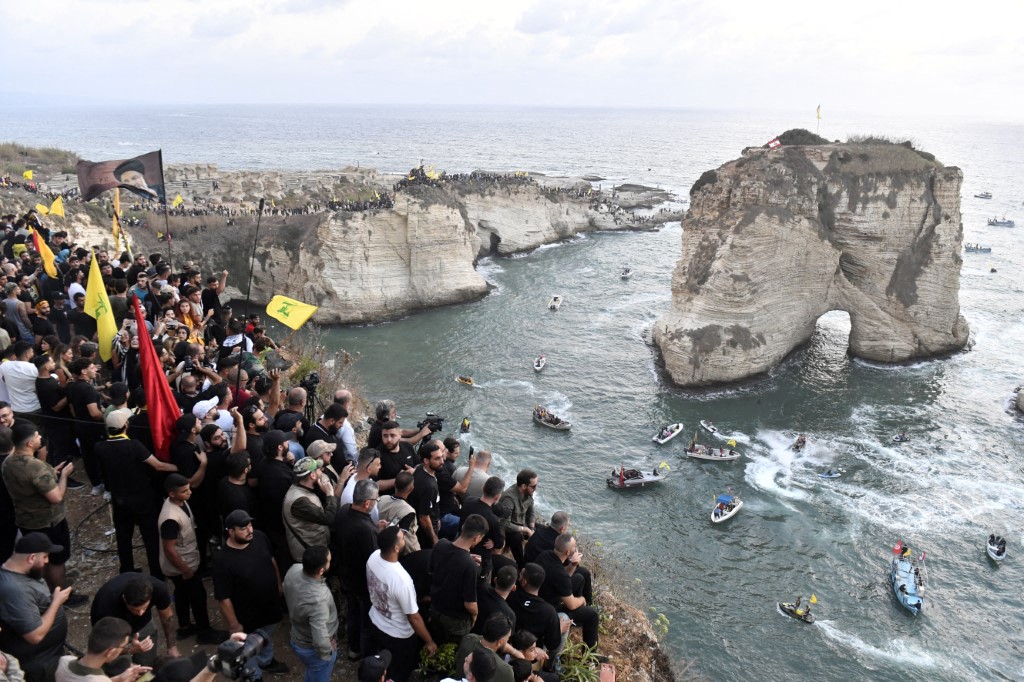The showdown at Beirut’s Raouche Rock—marked by blatantly breaching the law and reneguing formal commitments—was not the last test in the ongoing clash between the logic of the legitimate state and the counter-logic of the illegitimate “mini-state.” Two pivotal confrontations have since followed, equally revealing and alarmingly exposing the widening rift between these two adversarial entities.
For now, the relationship remains in a stage of friction and antagonism, just short of outright collision. This fragile pause is sustained by some state officials clinging to a “shock absorber” strategy, to avoid the re-ignition of civil war—an outcome widely deemed unrealistic for practical reasons. The mantra of “civil peace first” and “the Lebanese army is untouchable” continues to justify restraint. Yet, history shows that this logic of avoidance has repeatedly weakened and fragmented the Lebanese state during its long cycles of conflict.
The first major test after the “Raouche uproar” emerged on the foreign policy front—a sphere closely tied to Lebanon’s very survival. The Lebanese state welcomed U.S. President Donald Trump’s twenty-point plan to resolve the Gaza crisis and, by extension, the wider Middle East conflict. By contrast, the “mini-state”—embodied by "Hezbollah", Amal, and their affiliates—signaled quick rejection, at least through their media channels.
For the state, endorsing the plan aligned with its longstanding position: rejecting wars, supporting negotiated settlements, and, critically, applying any Gaza formula to Lebanon itself by confining weapons to legitimate state institutions and ending the militia era. The mini-state, however, remains wedded to the “sacredness of its arms,” repeating its familiar slogan: “We will not leave the battlefield nor will we surrender the weapons.”
This stance has only deepened "Hezbollah" and Amal’s isolation—not just internally, where most Lebanese factions stand against them, but also across the Arab and Islamic worlds, and among Western and Eastern states alike, with Iran as their lone backer. Trump’s plan, in effect, spotlighted Tehran’s isolation and its reliance on regional proxies.
That explains Iran’s orders to the Houthis in Yemen to abandon their “truce” with Washington and renew threats against U.S. ships in the Red Sea, as well as its directive for "Hezbollah" to raise its voice against disarmament and confrontation with Lebanese legitimacy.
The real test will come if Hamas and its allies decide to accept the plan, perhaps with cosmetic amendments. Tehran has already moved swiftly to push Hamas toward rejection, cloaking its pressure under the guise of “demanding amendments” that are, in reality, designed to sabotage the process.
The second test is domestic, yet tightly bound to foreign policy. It centers on the sharp split in Parliament over the right of Lebanese expatriates to fully participate in electing all 128 members of parliament.
The real obstruction was not merely the absence of quorum in the last session—it was the denial of a constitutional right. Speaker Nabih Berri blocked more than 67 MPs who had sought to introduce an urgent bill to guarantee this right.
The move backfired. For the first time in 33 years, Berri lost his grip on Parliament, unable to secure a quorum. It was a political blow, tarnishing his decades-long dominance and marking a significant personal setback.
But the deeper national failure lies in the impossibility of reconciling the “fire of the mini-state” with the “water of the state.” Every attempt at coordination has collapsed—from President Joseph Aoun’s eight months of fruitless dialogue with “the men of arms,” to the reneguing of the “Raouche Agreement,” which mocked the state’s authority, and now, the fundamental divide over the Gaza plan.
So far, all efforts at persuasion have failed in the face of "Hezbollah"’s entrenched denial of war outcomes and the shifting balance of power. Their fear remains that any Gaza settlement could extend to the question of arms in Lebanon, ultimately forcing acceptance of the framework outlined by what they derisively call the “global big brother,” Donald Trump.
Until a moment of reckoning—or perhaps a miracle—occurs, Lebanon is destined to remain divided between two parallel lines: the state and the mini-state. And in today’s Lebanon, miracles are in short supply.
Please post your comments on:
[email protected]
 Politics
Politics







